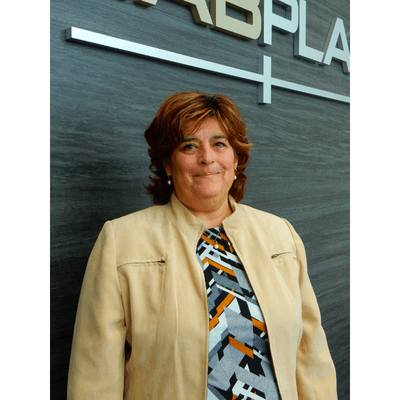The survival and resale value of Québec’s manufacturing sector depends on digital transformation, the Industry 4.0.
By Nicolas Sacchetti

Danielle Lafond, CEO Fonder of LABPLAS
Taking the digital turn doesn’t necessarily mean embarking on a major project. Setting a goal to acquire a self-transformable handling system, such as a manipulator arm or a pneumatic lifting system, quickly generates added value. This enhances performance, ease of execution, and versatility.
Danielle Lafond is the founding president of LABPLAS, a Quebec-based company specializing in the manufacture of sterile sampling products for safety and composition analysis, including surface sampling to detect E. coli, salmonella, and listeria. As a major international exporter, supplying products to 93% of the market in 60 countries, Labplas serves markets such as veterinary, pharmaceutical, and agri-food laboratories.
Ms. Lafond participated in a webinar on female governance and leadership in innovation ecosystems. This event was presented by 4POINT0 as part of the first International Conference on Policies, Practices, and Processes Related to Innovation Ecosystem Performance (P4IE) from May 11 to 13, 2021.
An innovative company, LABPLAS’s engineering department has enabled it to manufacture 90% of its machinery. LABPLAS also has an IT department and a microbiology laboratory that allows them to innovate in both automation and the design of new products.
« The most successful companies are those that ride the technological wave; if you wait for everyone to have the technology, you’ve missed the boat, » says Danielle Lafond, founding president of LABPLAS
Breaking Down the Task
To generate enthusiasm for technology, she recommends breaking projects into small steps to ensure that victories accumulate and are celebrated. This builds people’s trust and encourages change. In this regard, Danielle Lafond encourages investors to approach business leaders with small projects. She points out that the majority of Quebec companies are SMBs, and some of them struggle to have a functional website. She also adds that aging senior executives may not necessarily want to invest millions as they approach retirement.
The 90-employee SMB embarked on its digital journey over 20 years ago. Danielle Lafond mentions that the first Enterprise Resource Planning (ERP) software, developed and implemented in the factory, dates back to 1994. ERP software integrates functions such as human resources, accounting and finance, decision support, sales, distribution, procurement, and e-commerce, according to the Quebec Office of the French Language (OQLF).
Artificial Intelligence – AI
For the past five years, Labplas has been studying the implementation of AI for quality control and automatic boxing of products.
In 2019, the company, with more than 30 production units, transitioned to Epicor Kinetic, a Cloud ERP. Kinetic is a set of supply chain management (SCM) software programs designed to work together. It is based on a Service-Oriented Architecture (SOA). People, systems, and processes are now connected. It is an interoperable system capable of communicating and working with others.
The OQLF defines SOA as “a flexible software environment broken down into services corresponding to the business processes of the organization, taking into account the specific needs and characteristics of the client system […] The advantage lies in the ability to eliminate incompatibilities that isolate the various applications of an organization, as these applications tend over time to function in closed silos.”
Product Lifecycle Management – PLM
PLM considers the product’s life stages, from design to discontinuation. In 2008, Labplas’ innovation led to the development of the first eco-friendly sampling bag, the Twirl’em Ecolo. “To this day, we are still the only ones on the market offering an eco-responsible solution in analysis laboratories worldwide,” notes Danielle Lafond.
Resistance to Change
As Western Washington University Economics Professor Steven Globerman wrote in the Vancouver Sun on July 11, 2019, “AI will eliminate jobs and create new ones.” He explains that automation increases productivity and the demand for skills, resulting in better wages for workers.
“Many computer scientists, including Canadian AI expert Yann Lecun, warn that it will take decades to build AI systems that come close to human intelligence. Furthermore, even as machine learning technology progresses and allows computers to make increasingly sophisticated decisions, new opportunities will arise for humans to use automated intelligence for entirely new professional activities and to perform their current tasks more efficiently.” Professor Steven Globerman
Danielle Lafond specifies that she took the time to clarify to her staff the intentions behind the implementation of AI in the company. She also committed to ensuring that no one would lose their job because of AI. LABPLAS’s founder reveals that putting humans at the center of the company is the key to its success.
“Leadership requires a dose of communityship.” Professor Henry Mintzberg, Management Studies, McGill Universityl
Considering expertise – from electromechanics to handlers to inspectors – and having a receptive ear to the issues and solutions expressed by them, resistance to the 4.0 transition is not a major concern in the company. LABPLAS expects the added value of AI to make employees’ tasks more interesting and motivating. “As a leader, my job is to facilitate this discussion,” says Danielle Lafond.
Communication
Danielle Lafond explains that communication is a key tool for leading a company. Communicating decisions as a leader and the reasons behind them. “In the company, I act as a coach to help my employees grow. Growing your people is growing your business,” reveals Danielle Lafond. She concludes on this note: “Staying true to oneself is how you gain credibility.”
To view the original article, click here.


Leave A Comment
You must be logged in to post a comment.